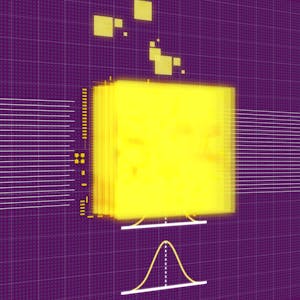Probabilistic Deep Learning with TensorFlow 2
Welcome to this course on Probabilistic Deep Learning with TensorFlow!This course builds on the foundational concepts and skills for TensorFlow taught in the first two courses in this specialisation, and focuses on the probabilistic approach to deep learning. This is an increasingly important area of deep learning that aims to quantify the noise and uncertainty that is often present in real world datasets. This is a crucial aspect when using deep learning models in applications such as autonomous vehicles or medical diagnoses; we need the model to know what it doesn’t know.
You will learn how to develop probabilistic models with TensorFlow, making particular use of the TensorFlow Probability library, which is designed to make it easy to combine probabilistic models with deep learning. As such, this course can also be viewed as an introduction to the TensorFlow Probability library.
You will learn how probability distributions can be represented and incorporated into deep learning models in TensorFlow, including Bayesian neural networks, normalising flows and variational autoencoders. You will learn how to develop models for uncertainty quantification, as well as generative models that can create new samples similar to those in the dataset, such as images of celebrity faces.
You will put concepts that you learn about into practice straight away in practical, hands-on coding tutorials, which you will be guided through by a graduate teaching assistant. In addition there is a series of automatically graded programming assignments for you to consolidate your skills.
At the end of the course, you will bring many of the concepts together in a Capstone Project, where you will develop a variational autoencoder algorithm to produce a generative model of a synthetic image dataset that you will create yourself.
This course follows on from the previous two courses in the specialisation, Getting Started with TensorFlow 2 and Customising Your Models with TensorFlow 2. The additional prerequisite knowledge required in order to be successful in this course is a solid foundation in probability and statistics. In particular, it is assumed that you are familiar with standard probability distributions, probability density functions, and concepts such as maximum likelihood estimation, change of variables formula for random variables, and the evidence lower bound (ELBO) used in variational inference.
None
Syllabus
Syllabus - What you will learn from this course
Week 1
TensorFlow Distributions
Week 2
Probabilistic layers and Bayesian neural networks
Week 3
Bijectors and normalising flows
Week 4
Variational autoencoders
Week 5
Capstone Project
FAQ
When will I have access to the lectures and assignments?
Access to lectures and assignments depends on your type of enrollment. If you take a course in audit mode, you will be able to see most course materials for free. To access graded assignments and to earn a Certificate, you will need to purchase the Certificate experience, during or after your audit. If you don't see the audit option:
What will I get if I subscribe to this Specialization?
When you enroll in the course, you get access to all of the courses in the Specialization, and you earn a certificate when you complete the work. Your electronic Certificate will be added to your Accomplishments page - from there, you can print your Certificate or add it to your LinkedIn profile. If you only want to read and view the course content, you can audit the course for free.
Is financial aid available?
Yes. In select learning programs, you can apply for financial aid or a scholarship if you can’t afford the enrollment fee. If fin aid or scholarship is available for your learning program selection, you’ll find a link to apply on the description page.
Reviews
Very good. Liked this course a lot, even though I recognize I should have had a better a background before taking it.
This has been a great course! The lecture videos are clear, concise, and to the point. The assignments are perfectly structured and the feedbacks from assignments are super helpful.
Really good course touching some really recent research in deep learning.
A very hard course but I leared a lot from it. Thanks Coursera and the great teachers
